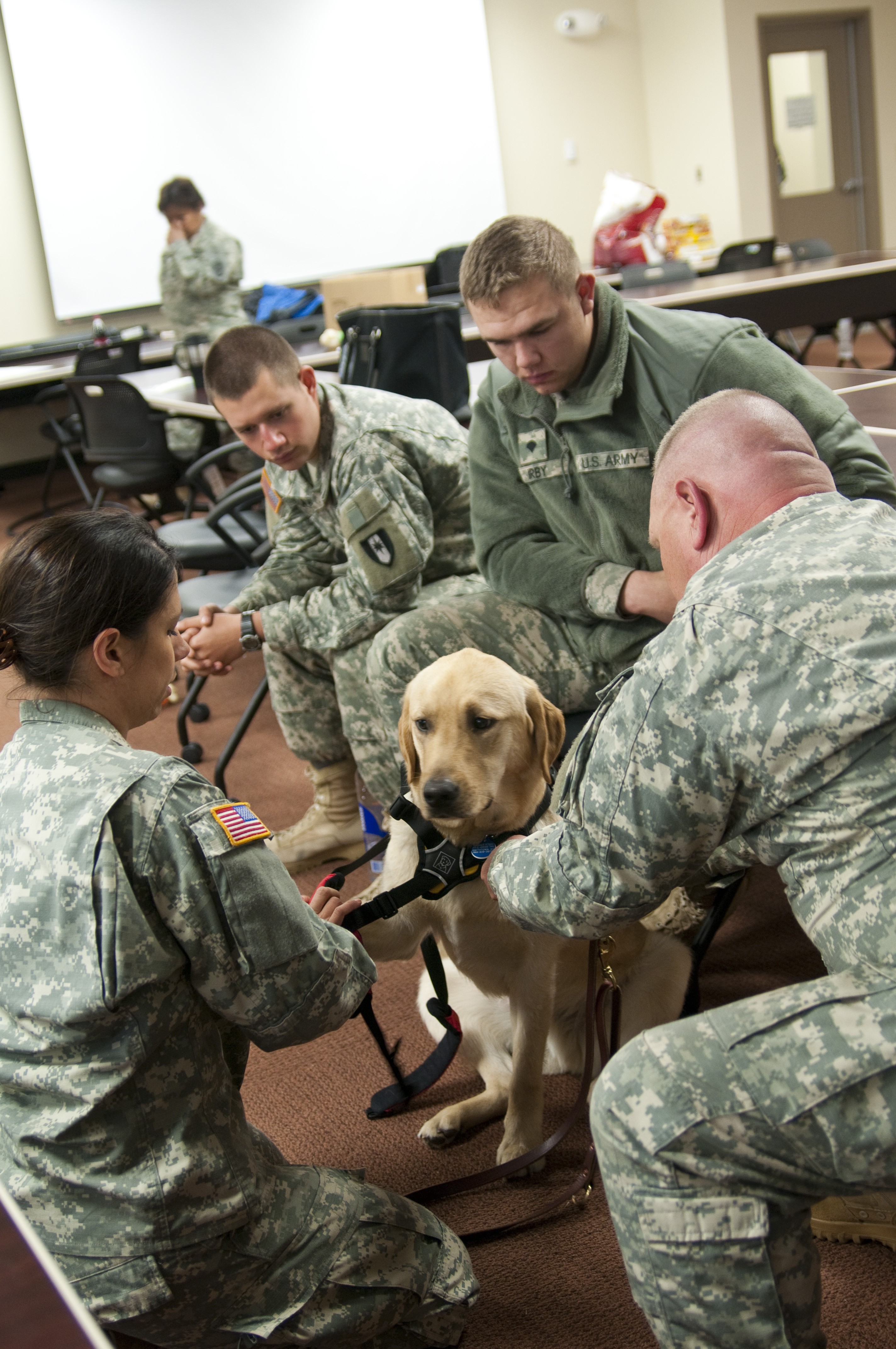
FORT BRAGG, N.C. - Preparing for deployment is always a task in itself. Soldiers must be physically, mentally and emotionally fit to be considered mission ready.
But the Soldiers of the 528th Combat Operational Stress Control Unit have to be prepared to fall on more than just equipment once deployed. The 528th will be taking over combat stress operations that involve using dogs for therapy overseas.
The 528th trained with therapy dogs from America's VetDogs and their trainers, March 28 to April 1. The training involved getting comfortable with the therapy dogs, simple commands, safety of the dogs, interacting with patients, and preparing to take care of the therapy dogs overseas.
Even though the dogs that they trained with will not be deploying with them, this training enabled the Soldiers, many of whom have never deployed with dogs before, to get the feel of handling and caring for the animal.
Sergeant DeJong May will be deploying for the first time as a dog handler. Trained as a medic, May decided to take the next step in his career and learn occupational therapy.
"Many people take to dogs," May explained. "I'm interested to see how therapeutic they (the dogs) can be and even as a handler, how therapeutic they will be to me as well. Some people may be scared of the dogs, but I hope these dogs will allow us to get others to open up during sessions and just relax."
Animal therapy in combat operations has been traced to World War I, however, dog therapy has been used in clinical areas since 2006. Each Army owned dog is given a job description, rank and are treated with the utmost respect.
"We have two therapeutic dogs deployed currently and we will be falling in on them once we arrive," said Capt. Christine Beck, an occupational therapist who will be taking care of Timmy downrange. "Apollo and Timmy will complete a two year deployment and come home with us."
Timmy, currently a sergeant first class, will more than likely be promoted to major once Beck takes over as his handler. Dogs usually outrank their handlers to protect them if they are ever mistreated, just as a Soldier would mistreat a higher-ranking official.
America's VetDogs are trained to be therapeutic dogs from birth. Military therapy dogs are trained not only to control combat stress, but also to assist in emotional therapy, and physical and occupational therapy.
According to America's VetDogs' web site, combat stress control dogs are specially trained canines that are deployed in theater to offer emotional support for servicemembers dealing with combat stress, homefront issues and sleep disorders.
"Dogs typically stay downrange for two years and go through two handlers during a deployment. The two year time frame was based on what we deemed safe for them to be there," said Col. Myrna Callison, deputy OT consultant. "That being said, if we realize a dog isn't performing the way it should or is having problems, we will send it home."
Theraputic puppies are raised in host Family homes until they are a year old, after which they are sent for formal training that last three to six months.
Before dogs are sent overseas, the dogs train for five days with the Soldiers to get acquainted with each other. The dogs are even taken home and cared for by the Soldiers at night. Each dog is bred and selected by VetDogs for their ability to tune into people's emotions, for their endurance and their versatility of learning.
Just as the dogs are specially picked, so are the handlers.
"Soldiers who handle the dogs should be occupational therapists and trained as an animal therapists," explained Callison. "It has to be a good fit for both the handler and the dog," she said.
"I really just lucked out," said Beck. "I've always wanted to work with animal therapy and now I get the chance to."
VetDogs, a non-profit organization, uses mostly labs and retrievers and has donated eight dogs to be used downrange as therapeutic dogs. VetDogs has also provided dogs to help wounded warriors for personal use. Dogs have been trained and used for therapeutic services to include traumatic brain injuries, amputees, seizure recognition, hearing and sight loss, post-traumatic stress disorders and diabetic management.
For more information on America's VetDogs visit www.vetdogs.org.

Social Sharing